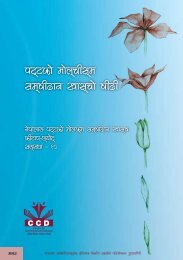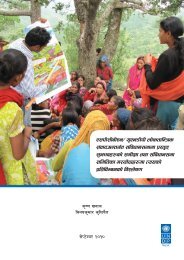English - Support to Participatory Constitution Building in Nepal ...
English - Support to Participatory Constitution Building in Nepal ...
English - Support to Participatory Constitution Building in Nepal ...
Create successful ePaper yourself
Turn your PDF publications into a flip-book with our unique Google optimized e-Paper software.
<strong>English</strong> “Multi-national” is commonly used<br />
<strong>in</strong> the bus<strong>in</strong>ess sec<strong>to</strong>r, for example a mult<strong>in</strong>ational<br />
company is one that operates<br />
throughout the world. There is a provision<br />
<strong>in</strong> the constitution <strong>to</strong> nom<strong>in</strong>ate the vice<br />
president from a different nationality than<br />
the President. Thus <strong>in</strong> the <strong>Nepal</strong>i context<br />
“national” refers <strong>to</strong> ethnicity. Literally Dalit<br />
means daliyeko <strong>in</strong> <strong>Nepal</strong>i. In India, cobblers<br />
have been named Harijan and they write it<br />
as their last name. The word Dalit has been<br />
established as an identity with<strong>in</strong> the Dalit<br />
community and it has been also accepted<br />
politically and socially. However, their<br />
issues relate <strong>to</strong> social justice rather than<br />
identification.<br />
Q. How is the right <strong>to</strong><br />
self determ<strong>in</strong>ation<br />
ensured for <strong>in</strong>digenous<br />
populations? -Pan<br />
Bahadur Gharti<br />
A. Regard<strong>in</strong>g the right<br />
<strong>to</strong> self determ<strong>in</strong>ation,<br />
the <strong>in</strong>digenous NGO<br />
Federation and other<br />
<strong>in</strong>digenous<br />
people<br />
<strong>in</strong>volved <strong>in</strong> different political parties have<br />
different op<strong>in</strong>ions. Therefore it is necessary<br />
<strong>to</strong> ensure that the constitution represents<br />
our sentiment.<br />
Q. In the context of <strong>Nepal</strong>, what type of<br />
right <strong>to</strong> self-determ<strong>in</strong>ation would be<br />
appropriate? -Tika Gauchan<br />
A. There are two thoughts about the right<br />
<strong>to</strong> self-determ<strong>in</strong>ation. Len<strong>in</strong> recognized that<br />
the right <strong>to</strong> self-determ<strong>in</strong>ation is the right<br />
<strong>to</strong> secede and compares it with the right <strong>to</strong><br />
divorce. Though there is the right <strong>to</strong> divorce,<br />
it is not used by all. The United Nations<br />
declaration and ILO 169 regard the <strong>in</strong>dividual<br />
and collective right <strong>to</strong> self-determ<strong>in</strong>ation<br />
as the fundamental right of <strong>in</strong>digenous<br />
people and also ensures that <strong>in</strong>digenous<br />
people will be <strong>in</strong>formed <strong>in</strong> advance of any<br />
activities be<strong>in</strong>g carried out which will affect<br />
them. However, <strong>in</strong> the context of Madhesh,<br />
the right <strong>to</strong> self determ<strong>in</strong>ation is l<strong>in</strong>ked with<br />
Madhesh Prov<strong>in</strong>ce.<br />
S<strong>in</strong>ce the old mechanism<br />
did not address the issue of<br />
disadvantage, this change<br />
<strong>in</strong> (Federal) structure has <strong>to</strong><br />
be accepted.<br />
- Yam Bahadur Gurung<br />
Ethiopia has guaranteed the right <strong>to</strong> selfdeterm<strong>in</strong>ation<br />
as the right <strong>to</strong> secede, but<br />
with the provision <strong>to</strong> conduct a referendum<br />
three years after a bill of secession is brought<br />
<strong>in</strong> the parliament. This is <strong>to</strong> provide sufficient<br />
time for the people <strong>to</strong> have second thoughts<br />
about secession.<br />
Other questions related<br />
with m<strong>in</strong>orities and their<br />
rights are <strong>in</strong>cluded later <strong>in</strong><br />
this report.<br />
Presentation on Fiscal<br />
Federalism:<br />
Prof Krishna Hachhethu<br />
expla<strong>in</strong>ed that the proposed federal f<strong>in</strong>ancial<br />
system has a provision of centralized<br />
revenue collection. The draft constitution has<br />
projected 88% revenue (<strong>in</strong>clud<strong>in</strong>g fore<strong>in</strong>g<br />
aid) concentrated <strong>in</strong> the center and and only<br />
12% <strong>to</strong> the 14 proposed prov<strong>in</strong>ces. This is<br />
similar <strong>to</strong> the practice of the Australian federal<br />
system. However, follow<strong>in</strong>g the pr<strong>in</strong>ciple of<br />
equalization, the center has the responsibility<br />
<strong>to</strong> support the less developed prov<strong>in</strong>ces by<br />
collect<strong>in</strong>g revenue from more developed<br />
prov<strong>in</strong>ces and redistribut<strong>in</strong>g it. He stressed<br />
that <strong>in</strong> the federal system, one prov<strong>in</strong>ce<br />
can be more developed than another but<br />
18 Federalism Dialogues Series 5




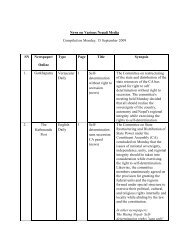

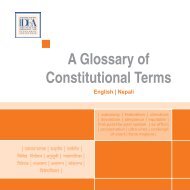
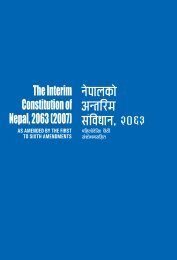
![g]k fnsf blntx? / gofF ;+l jwfg](https://img.yumpu.com/49483602/1/184x260/gk-fnsf-blntx-goff-l-jwfg.jpg?quality=85)
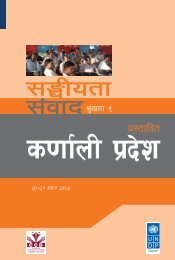
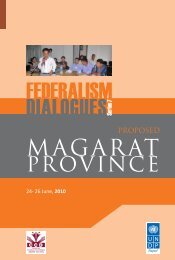
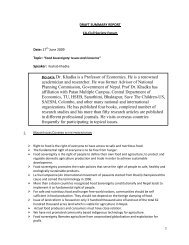
![+ljwfg;ef, /fHosf]k'g](https://img.yumpu.com/41604075/1/184x260/-ljwfgef-fhosfkg.jpg?quality=85)
